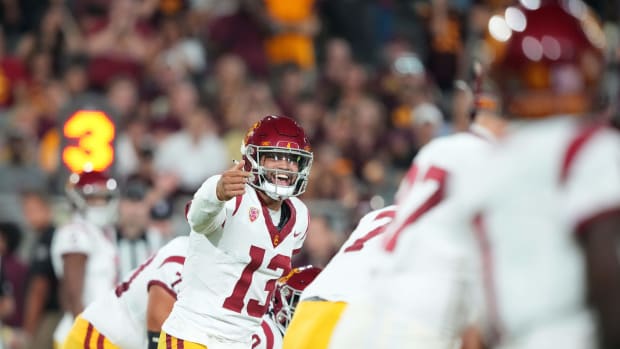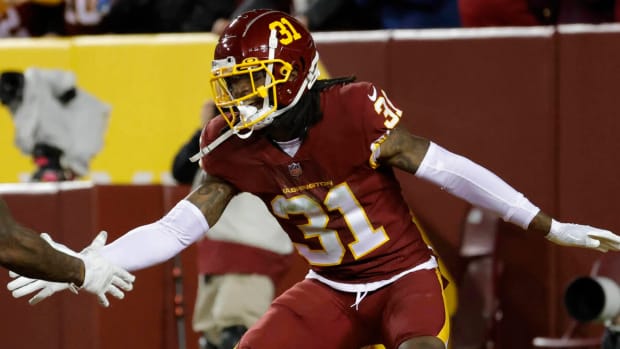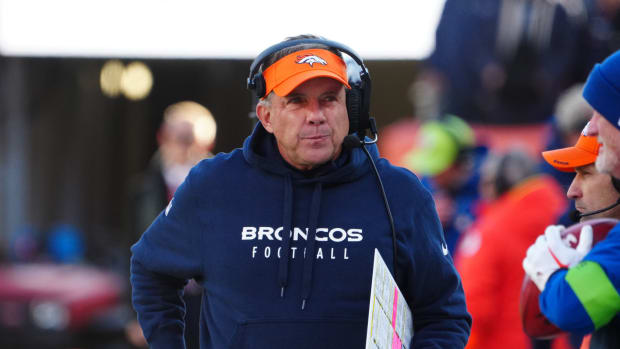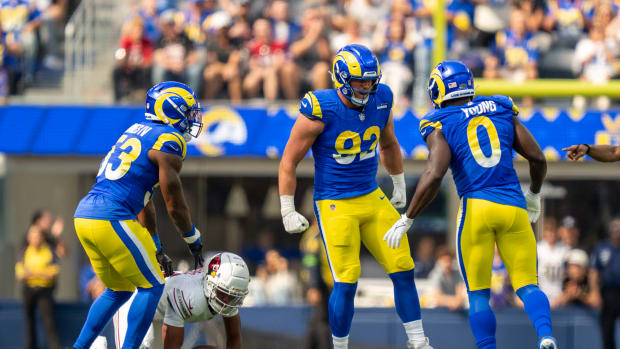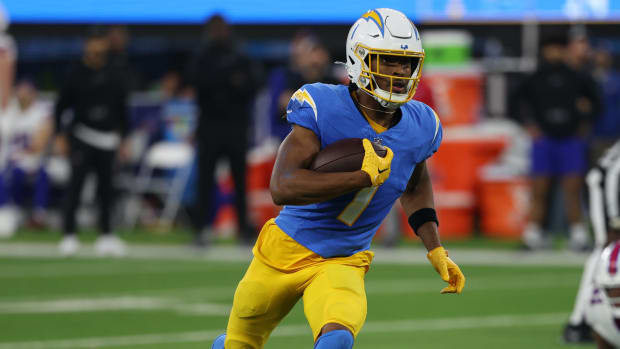The 49ers’ X-Factor Isn’t Christian McCaffrey, George Kittle or Brock Purdy
In the past five NFL seasons, the San Francisco 49ers built arguably the most complete roster in professional football. Not once. All five seasons. They secured the services of generational talents from Nick Bosa to Fred Warner to Richard Sherman, Christian McCaffrey, George Kittle and Deebo Samuel, among others. And yet …
In those same five seasons, San Francisco lost a Super Bowl and dropped two conference championship games, with one nonplayoff campaign and this current run mixed into this stretch. Throughout it, the 49ers could sometimes seem cursed, whether from injury outbreaks or quarterback shuffling or close losses impacted by injuries or signal-callers.
Many examine such circumstances and offer the simplest reason: San Francisco was no more than a quarterback away most years. It’s not that simple, though, and the oversimplification starts with ignoring the 49ers’ offensive evolution and where it led, to the crux of all future ambitions for this hard-luck, well-built franchise, including winning Sunday’s conference championship clash with the Detroit Lions. That crux, the x-factor to end all x-factors, isn’t quarterback Brock Purdy, Kittle or even Bosa. It’s Samuel, upon which so many legacies and reputations rest.

Samuel injured his shoulder against the Packers, with NFL insiders placing his chances to play in the NFC championship against the Lions at around 50-50.
Dan Powers/USA TODAY Sports
Samuel departed San Francisco’s 24–21 victory over the Green Bay Packers on Saturday early on with a shoulder injury severe enough to require X-rays. He watched the rest of the win from the sidelines, watched the offense stall, even as Packers defenders dropped interceptions and Purdy & Co. made just enough plays to advance. Good news was delivered Monday, with every NFL insider placing Samuel’s chance to play in six days around 50-50. Those X-rays were negative, which meant no fracture, which meant what matters most now is how quickly his shoulder heals. This comes from one source at team headquarters who described the vibe around Samuel’s availability as “cautiously optimistic—maybe even more than that, but no one wants to jinx it.”
Makes sense. If Samuel isn’t more likely to play than not, of course everyone involved hopes, prays and offers sacrifices that he will. In all likelihood, if he does play, Samuel will primarily match up with C.J. Gardner-Johnson, an elite cornerback who intercepted Baker Mayfield on the Tampa Bay Buccaneers’ first possession Sunday, helping Detroit win its second playoff game in the last 32 seasons. That said, the previous time these teams played, Samuel racked up nine catches for 189 yards and a touchdown in the 2021 season opener. That said, Gardner-Johnson was still playing for the New Orleans Saints back then.
All that said, here’s what really matters: This season, when Samuel played a full game, San Francisco went 12–2 while averaging 31.4 points and 412.4 yards per game. The four times he either didn’t play or left due to injury in the first half, they went 1–3, while averaging 18.8 and 339. This pattern also extends beyond this season. Since drafting Samuel in 2019, the 49ers are 8–9 without him in the regular season, according to an analysis from Stat Muse, including 0–2 before this postseason and (just barely) 1–0 in these playoffs. For the 8–9 mark, many of those wins came against less-than-elite opposition.
The good news, for what it’s worth, is that Samuel has played in each of the 49ers’ 10 postseason games since arriving in San Francisco. In those games, they’re 7–3. Of course they are, which speaks to the evolution in play and why it matters the most for Samuel specifically.

To win, Shanahan needs Samuel. And not at full health, necessarily, but healthy enough to play.
Sergio Estrada/USA TODAY Sports
Let’s start with the obvious: There is no brighter offensive mind in the modern NFL than Kyle Shanahan. The offense he designed and tweaked and adapted to the talent on his rosters isn’t the reason that San Francisco hasn’t won a Super Bowl since he took over in 2017.
What follows is my understanding of the 49ers’ offensive evolution during his tenure in San Francisco. That understanding comes from multiple interviews with eight previous or current members of his offensive coaching staff that were done over the past seven years.
Shanahan’s scheme, the bedrocks of it, the emphases that hardly change at all, is built on deception, on showing plays that look the same but present endless variations. That could be changing the order of players in any one bunch formation, changing the depth of where targets line up, making the same formation wider or tighter and using a ton of play-action to glean data on how any particular defense strategized for any specific game. The computer processor he calls “my brain” takes over from there. But just because there are bedrocks, ideals and strategies he won’t change, doesn’t mean this same scheme stays rigid. Oh, no. It changes all the time.
It maximizes quarterbacks in certain ways such as making them more accurate and more efficient, because each must value precision above all. Beyond that, assistants say, Shanahan seeks play-action proficiency. That’s the primary reason he wanted to bring Kirk Cousins to San Francisco in 2018, because Shanahan considered Cousins the best play-action passer he had ever seen. That’s one reason why the 49ers drafted Purdy. And one reason Shanahan adored the skill set of Purdy’s current backup, Sam Darnold. Each presented an efficient option, making all enough of an ideal-ish fit for Shanahan to maximize their talents.
So, in some ways, did Jimmy Garoppolo, the quarterback San Francisco traded for with New England midway through the 2017 season. Like every quarterback before him in a Shanahan system—from Matt Schaub to Matt Ryan and on down the list—Garoppolo excelled in this scheme. But he also didn’t play exactly like Cousins, Purdy or Darnold. In some ways, like accuracy on throws that traveled 15 yards or fewer, Garoppolo was better, maybe the best in the entire NFL. He also produced uncommon, remarkable release points, which helped in the face of pressure. But he struggled more with deep throws, which allowed opposing coordinators to adjust how they defended the 49ers’ offense, packing more coverage types in close.
The differences with Garoppolo, according to three sources who were on that staff in San Francisco, forced Shanahan to change how he called plays. Garoppolo wasn’t in the top tier of signal-callers, those four to five rare humans in most seasons who can lift a franchise to a championship almost by themselves. But he was in the second tier, with potential to grow in that offense to one of that tier’s best. Garoppolo excelled at finding spots within a defense, seeing open space and reacting to it, in fractions of seconds and with perfect timing, from the style of throw to the release to the trajectory. To do that, while being chased by behemoths and making adjustments in real time, was no less than a gift.
Watch the 49ers with Fubo. Start your free trial today.
The 49ers—behind Shanahan, then assistant Mike McDaniel and others—adapted to Garoppolo, and his strengths in ways that are now being seen across the NFL. Hence all the catch-and-run adaptations the 49ers staff drew up. They added more misdirection, more speed, crisscrossing more fields, creating traffic and then … space, more run-pass options, and more jet sweeps and end-arounds and reverses from elite runners who happened to play running back or receiver. With each, San Francisco’s coaches were utilizing space but not the downfield kind necessarily. They were using horizontal space to stretch the defense, which was … brilliant.
Coaches from those staffs cite Marquise Goodwin as just one example of elite production that tied directly to the adaptations. Goodwin’s career year, far and away, coincided with Jimmy G’s arrival in 2017 and their torrid, late-season stretch. Goodwin set highs in nearly every offensive category, and in those five games playing with Garoppolo, he averaged 5.8 receptions and 76.8 receiving yards, despite only 10 targets over the final two weeks due to lower snap counts. Better yet, Goodwin made pivotal plays that helped San Francisco win those games. He fit well with Garoppolo’s skill set, his speed combining with the QB’s feel and flow.
“It blew my mind because the situation he was put into, there’s no way he could know what was going on confidently,” Shanahan told Sports Illustrated in 2020. “He worked his best to do it, and, at times, he figured it out. But most of it was just instinct and ability. What he did in that five- or six-game span was unbelievable and warranted what we had to do to keep him.”
Those changes would bleed into many offenses. The 49ers still win, often, in part, by deploying them, along with how Shanahan and his new circle of confidants adapted their adaptations in the past few seasons.
Where Cousins, for another example, turned play-action into magic from snaps taken under center, Garoppolo played best from the shotgun, facing the defense, armed with that precision and those instincts. The 49ers began running more of a gap scheme than a zone one and added players such as shifty running back Jerick McKinnon, who fit their adaptations, all of which started with Shanahan and how he fit a new offense around Garoppolo.
One of those players, of course, was Samuel. Listed as a receiver, he played more like a hybrid, half wideout, half running back, all speed and force mixed for a lethal combination. He freed the 49ers’ other elite targets, from Kittle to, later, McCaffrey and others. Which is how, even after Shanahan shipped Garoppolo out of town and discovered Purdy’s greatness, the engine for San Francisco’s push to win the storied franchise’s first title this century, hinged not on its pair of MVP candidates, nor its generational tight end.
To win, they need Samuel. And not at full health, necessarily, but healthy enough to play.

Shanahan discovered Purdy's greatness, but Samuel is the hub around which Shanahan's offense rotates.
Kyle Terada/USA TODAY Sports
Shanahan’s offense, from the yards and points it generated to the quarterbacks it improved to the games it won, remains, in an overall sense, beyond reproach. It can—has, is, will—maximize quarterbacks who fit well enough within it but rarely in the same way. His impact on the NFL—specifically, offensive schemes—changed the league and more than once.
But the lack of championships, despite the rosters of his teams the past five years, is significant. The point isn’t to blame Shanahan here but to understand why San Francisco hasn’t quite done what it wants and expects to do each season. Samuel is the hub around which the rest of the offense rotates, no disrespect intended to Purdy or anyone else. It’s also not like the 49ers can’t win without Samuel, whether he’s inactive this week or for both games they could play the rest of this season. Some of Purdy’s struggles against the Packers could be hung on terrible weather and wet footballs; others, on the brilliant game plan cooked up by Joe Barry, Green Bay’s defensive coordinator.
This week, Barry won’t be game-planning. The weather forecast, at least on Monday, called for sunshine at Levi’s Stadium in Santa Clara, Calif., along with temperatures around a balmy 69 degrees for this time of year. It’s fair to think the 49ers could be strengthened, emboldened, by winning last week the way they did, tough and resilient and ready to fight. There’s no shortage of talent left on offense, whether Samuel plays, whether he’s at full health (unlikely) or not (pretty likely). There’s no reason to think Purdy will get injured, like last season, at Philadelphia, which effectively ended San Francisco’s chances to win that conference championship game.
But one thing remains certain: They feel better with Samuel in the lineup, for that offense and how it changed, for this season and what’s possible. And, of course, for the elusive championship they just might win three Sundays from today.

































